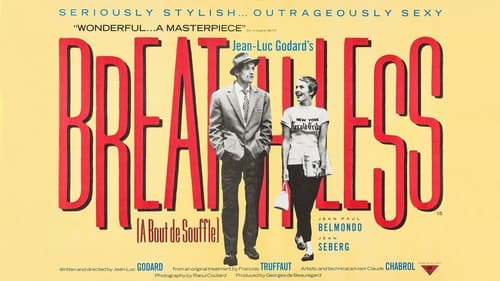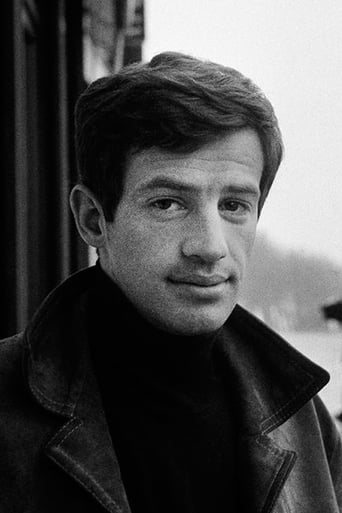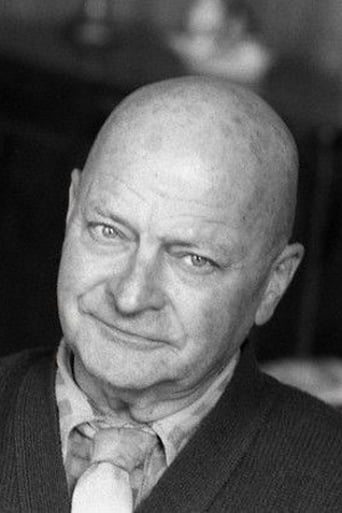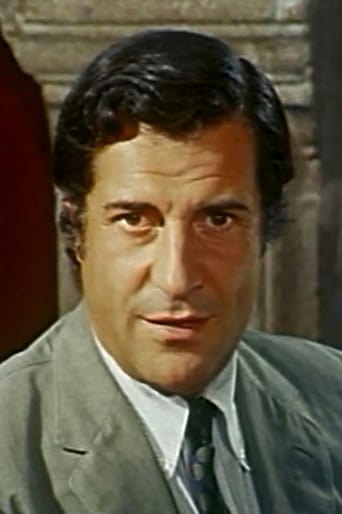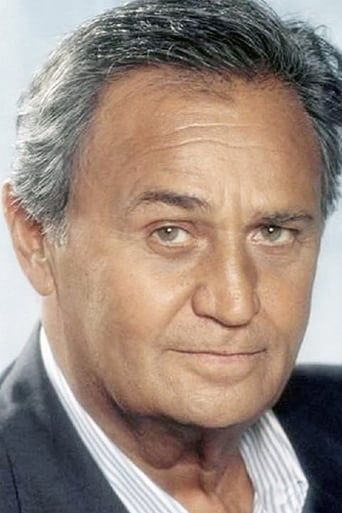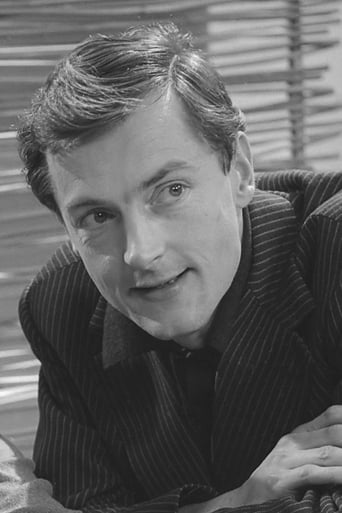Acensbart
Excellent but underrated film
Intcatinfo
A Masterpiece!
Zandra
The movie turns out to be a little better than the average. Starting from a romantic formula often seen in the cinema, it ends in the most predictable (and somewhat bland) way.
Francene Odetta
It's simply great fun, a winsome film and an occasionally over-the-top luxury fantasy that never flags.
Movie_Muse_Reviews
Hailed among the films that started the French New Wave, Jean-Luc Godard's "Breathless" is a choppy, anarchic film as commanding as it is carefree. A riff on the American crime/gangster films of the two decades that preceded it, "Breathless" has aspects of both imitation and transcendence, but mostly a liberated spirit that no doubt constituted a change in French filmmaking.Embodying that spirit is star Jean-Paul Belmondo as car thief Michel Poiccard, a man who lives by the whim of his desire, even when it means grinding his ever-thrumming internal engine to a halt for the sake of a woman, specifically Patricia (Jean Seberg), an American in Paris hawking newspapers as she aspires to be a journalist. Although Belmondo's performance sets the tone and guides the film (as does Michel's shooting of a police officer, inciting the action), in so many ways it revolves around Seberg's driven, liberated feminine energy.Godard's use of jump cuts (a film technique born out of a need to cut down the runtime while avoiding chopping entire scenes) suggests he's something of a rebel filmmaker, but there are lengthy takes too as time seems to stop in Patricia's apartment as they each feel out how they feel about each other. Michel's relentless libido seems to dominate this section in a rather distracting way, but operating in minimal space, Godard shows his sure-handedness and awareness of the classic cinematic techniques that surely inspired him.With the exception of when Belmondo and Seberg share screen time, the storytelling isn't nearly as compelling as the energy and style of the film. The way that the romance and the crime story cross paths in the end turns out to be a saving grace of the narrative and make a good case for the film as an intellectual accomplishment, but if the film is indeed a triumph, it's because of the visuals, the pacing, the repetition of the jazz piano score culminating in a wholly unique cinematic experience.Above all else, "Breathless" embodies this feverish, burning passion of cinema as art form, evident purely in its playfulness and recklessness. It stands today as a window into a laboratory of new filmmaking ideas; Godard tried to balance the classic mise en scene with a new approach to stitching scenes together, all while staying relevant to the culture and philosophy of its era. Perhaps this is how all great cinematic turning points are made; a true cinefile in his or her day borrows from his or her inspiration while striving to tell a familiar story in a way that may push boundaries, but will certainly speak more to emerging tastes and attitudes.Without historical context, "Breathless" is no masterpiece identified as powerfully influential, but in this case, context is nearly everything.
Dalbert Pringle
For starters - I certainly am quite clueless as to why this film earned the title of "Breathless" for itself. The events that took place in its story were certainly far from being an exhilarating (breathless??) movie-experience.If this b&w, 1960 film is actually considered to be the one that initiated the whole French New Wave movement in cinema - It's really got me wondering what French cinema was like prior to this (apparently) revolutionary transformation in film-making.All-in-all - Even though I wouldn't say that "Breathless" was great movie-making - It certainly turned out to be considerably better than I had expected it to be.And - Last, but not least - I sure do wish that this film's protagonist, Michel Pioccard, hadn't been portrayed as being such a lousy, despicable, and untrustworthy bastard that he was. For me - This guy's rotten-to-the-core character really marred the story, big-time.
elvinzhang
A character study about Michel ( Jean-Paul Belmondo ), a young criminal who acts tough and tries to be like Bogart, and Patricia (Jean Seberg), an American who sells the New York Herald- Tribune. Patricia's involvement with him seems to be purely because of her curiosity towards his affection and his strange, comical behavior almost identical to the one which is shown again in "Pierrot le Fou". Jean Seberg's acting is ridiculously dull and her expressions throughout the film are almost as uneventful as the plot of the film itself. Jean- Paul Belmondo's acting on the other hand, although full of style is still unconvincing. You cant really blame him though, his character's persona is just not in any way believable. The level of detachment and obliviousness is simply too extreme. The Film's music is also absolutely horrendous, I doubt I could recall a movie that has a genuinely worse soundtrack.However, the truly disgusting thing about this movie, is the amount of jump cuts Godard forcibly tries to stuff down our throat, it makes me wonder whether the films last lines were really referring to Godard himself.Out of boredom ( due to the films basically non-existent plot ) I couldn't help but resort to wondering whether these extremely disturbing 'jumpcuts' were necessary. The answer, which is also the answer to most French New Wave films is yes and no. If the film did not contain these 'jump cuts', many of them purposely used in the most unconventional way possible, the film would not have its historical importance and status of being revolutionary. The jumps cuts in this Film have no real purpose other than to rebel against cinema norms at the time and attract attention as a result. In other words there was no 'message', 'deeper meaning' or even aesthetic purpose behind them. Its only purpose was to distinguish this film, which without all its pretentious bull would be no more than a boring, poorly written and poorly acted character study, from all the other boring, poorly written and poorly acted character studies. The Film instead is a NEW, DIFFERENT and MODERN boring, poorly written and poorly acted character study. These days the film is met with enthusiasm, mainly because without objective standards, style is valued over substance and originality is valued over genuine merit. Although you cannot deny the historical importance of this film as a cinematic landmark, you can definitely question it. There's no harm in rebelling against norms to create effect but never at the expense of overall enjoyment. Breathless however, simply rebels for shock value and to standout as something new, different and as most New Wave fans would put it 'Bold.'
Ore-Sama
Some films are simply famous without necessarily being influential, or at least not widely so. Then there are films that are not merely well known, but a significant advancement that alters cinema forever. Some of these films are artifacts that are really only worthwhile as a piece of history. Examples of this would include something like "Voyage to the Moon", which meant a lot to film history, but as a film, is so primitive as to be laughable. Then there are those works that function both as great films and significant steps in cinema. A number of silent films fall under this category, such as "Metropolis", "Cabinet of Dr Caligari", and "Nosferatu". "Breathless" falls into the later category, not only being one of the most influential films ever made, but also a truly great film.The plot, thin as it is, revolves around Michel (who takes on the look and mannerisms of Humphry Boggart) who is chased down by a cop he ends up shooting. The police are after him. We see a few scenes of the police questioning people and hunting him down, but it's not the focus of the film. Michel instead steals some money, gets together with a woman named Patricia, trying to sleep with her, then run away from her, and get the money he's owed.Much in the way Godard broke and played with the rules of cinema, so Michel makes his own rules, dictating his own pace. He knows the police are after him, and he does try to avoid them, yet he refuses to be inconvenienced. He does whatever he feels like doing at the time. Make no mistake, Michel is far from a saint. Yet it is this determination to do what means the most to him, however random it seems, or however shallow it seems, that gives "Breathless" real humanity beneath the detached way the characters act. We're watching someone who, knowing his demise could come at any moment, will make as much as he can of the time he has. Knowing that, nothing he does in this film is meaningless. Even the tiniest of things, such as him stopping to admire the humphry boggart poster, means so much more.Make no mistake, though, there's plenty else to admire about the film. The cinematography is fantastic. Using a hand-held camera and a wheelchair instead of a dolly for moving shots, we have a movie that rarely feels still. The camera is often intimately close, using only a few far away shots (often simply to establish distance between characters). The jump cuts this film is famous for are used stylistically. Even when indoors,it feels like things are in constant motion, ensuring that the film never feels slow, and even after all these years, the visual style of the film feels unique unto itself, even among the rest of Godard's filmography.Something also must be said of the dialogue. It's fast, it's snappy, topics change constantly, characters contradict themselves, make references, etc. It's certainly stylized dialogue, delivered so naturally, but this dialogue gives the film sheer entertainment value. There's just something about watching the conversations unfold that is hypnotic, almost a thing of poetry. The apartment scene in particular I rate as one of the greatest scenes in cinema.As a piece of history, "Breathless" is equally fascinating. While an argument could be made about what the best french new wave film is (there's certainly steep competition in that department, "The 400 Blows" and "Pickpocket" as two examples), "Breathless" is the defining one. The film, more than any other, that gave a sense of freedom to film makers everywhere, showing they didn't have to limit themselves to a rigid narrative structure. The jump cuts also, of course, were a huge innovation and have been used to the point of almost tedium throughout cinema ever since. There's certainly more to say on the historical side, but I don't want this to get too long.The casual viewer will likely have a tough time with this one. Unlike relatively straightforward french new wave like the before mentioned "400 Blows", "Breathless" is abstract and likely to leave the unprepared viewer bored, confused and dismissive. I warn you do not go into this movie expecting a thriller, or a film that is in anyway conventional. This is a film where characters waste time,conversations go nowhere and last a long time, and the plot is the least relevant thing occurring for 95% of the movie.I know, that sounds awful, and in the hands of someone else, "Breathless" would be a worthless train wreck of a movie on par with the works of Uli Lommel. Yet in the hands of "Godard", it is a mesmerizing film experience.




